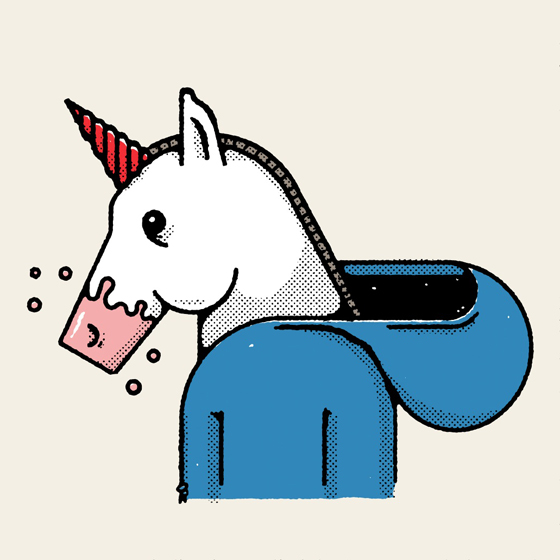科技泡沫无人再提,独角兽不用再逃了
|
我们在2015年底开始做这个专栏,当时的科技热潮让人觉得它有崩溃的危险。共同基金和机构投资者向大型高价值私营初创公司撒钱,从而创造出了所谓的独角兽时代;随后,由于下错注而受伤的投资者突然开始撤离。估值下调、收入未达到预期、现金捉襟见肘以及收购失败的消息给这门炙手可热的生意泼了冷水。所有人都停了下来,然后问道:“是不是出现科技泡沫了?”——这几年投资者一直在探讨这个问题,也一直对此感到担心。但没有什么东西真的破灭,那种泡沫感也已不复存在。 近三年时间过去了,我们的专栏也做了27期,科技泡沫问题已经不再重要。在繁荣发展的领域中,有更多的问题需要担心。有害的性别歧视和性骚扰文化走上了前台并占据了中心位置,这要感谢越来越多的警示者。初创企业的卑劣行为引起高度关注,从而让这个行业对“假装成功,直到真的成功”的强行成功哲学产生了疑问。作为世界上最有价值的风投支持型初创公司,优步一直是运转失灵的鲜活例子,它的董事会、联合创始人以及投资者在媒体上互放黑枪,并通过打官司来争夺公司控制权。2017年,初创行业感受到了这几年不惜代价的唯增长论留下的后遗症。 |
When we started this column in late 2015, the technology boom felt like it was in danger of collapse. Mutual funds and institutional investors had created the so-called Age of Unicorns by pouring money into large, highly valued private startups; suddenly investors were in retreat, burned by bad bets. Talk of valuation markdowns, missed revenue targets, cash crunches, and failed acquisitions threw cold water onto a blistering business. Everyone stopped asking the question investors had been debating and fretting over for the past few years: “Are we in a tech bubble?” Nothing had really burst, but it no longer felt bubbly. Nearly three years and 27 columns later, the tech bubble question is beside the point. Inside boom-land, there’s a bigger set of issues to fret over. A toxic culture of sexism and sexual harassment has moved front and center, thanks to a growing group of whistleblowers. High-profile instances of shady startup behavior have caused the industry to question its “fake it till you make it” philosophy of hustling your way to success. Uber, the most valuable venture-backed startup in the world, continues to be a shining example of dysfunction as its board of directors, cofounders, and investors snipe at each other in the press and through lawsuits over who controls the company. In 2017, the startup industry is experiencing the fallout from years of prioritizing growth at any cost. |

|
并非所有初创企业都背离道德、估值过高、有害或机能失调。但令人恼火的大问题掩盖了科技界的成功故事,并让“是否出现泡沫”的问题显得尤为目光短浅。外部人士提出的问题包括科技平台应该为仇恨和错误信息在美国的传播承担责任吗?Facebook、苹果公司、Alphabet和亚马逊的力量过大了吗?科技会减少就业机会吗?几年前,我们想知道这场科技盛宴是否已经接近尾声。现在,我们思索的问题是这场盛宴的主人是否从根本上就愤世嫉俗。 何以至此呢?部分原因是科技行业已经一头扎进了自身泡沫之外的世界。就像人们说的那样,软件“吞噬”了一切,从交通运输到酒店,从零售到汽车,再从医疗保健到教育。在这个过程中,科技行业继承了这个世界的问题。如果想到自动驾驶汽车可能让500万美国职业司机失业,共同基金下调优步估值引燃的熊熊怒火就显得不那么重要了。繁荣遇上了厄运。 虽然不是特别让人满意,但我们觉得用一篇悲观的文章为这个专栏收尾还算合适。繁荣一词贴合科技行业的增长情况;观点则体现出怀疑色彩。现在世界对初创公司和科技行业的怀疑达到了前所未有的程度。科技界可以把这样的态度解释为对自己的攻击。但我更愿意看到科技界发挥它众所周知的作用,那就是把问题变成机遇,并且清理一些自己留下的烂摊子。这实际上、或许、真的、不开玩笑,是个让世界变得更好的机会。(财富中文网) 译者:Charlie 审稿:夏林 |
Not every startup is unethical, overvalued, toxic, or dysfunctional. But the tech world’s success stories are now overshadowed by big, vexing issues that make the “Are we in a bubble?” question look pathetically myopic. Outsiders are asking things like, Are tech platforms responsible for spreading hatred and misinformation in America? Are Facebook, Apple, Alphabet, and Amazon too powerful? Will technology eliminate our jobs? A few years ago, we wondered if the tech party was coming to an end. Today we ponder if its hosts are fundamentally misanthropic. How did we get here? In part because the technology industry injected itself into the world beyond its bubble. Software is, as the saying goes, “eating” everything from transportation to hospitality, retail to automotive, health care to education. In the process, the tech industry inherits the world’s problems. Outrage over mutual funds marking down Uber’s valuation feels beside the point when you consider that as many as 5 million professional drivers in the U.S. could lose their jobs to autonomous vehicles. Boom, meet doom. While not particularly satisfying, it feels fitting to end this column’s run on a gloomy note. The “boom” in its name nods to tech industry growth; the “view” signals an air of skepticism. Never has the world been more dubious of startups and the technology industry than it is today. The tech community could choose to interpret that stance as an attack. I’d rather it do what it’s known for—turning problems into opportunities—and fix some of the messes it has made. It’s a chance to actually, maybe, seriously, no joke, make the world a better place. |













